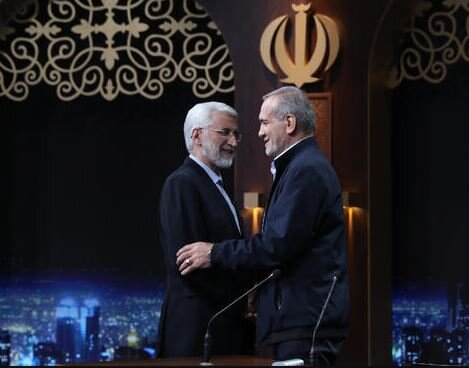Candidates address decreased voter turnout in first presidential debate before runoff

TEHRAN – The two candidates competing in the July 5 presidential runoff, Saeed Jalili and Masoud Pezeshkian, have acknowledged the decline in voter participation for the first round of the snap presidential election, a decrease of 10% from the 50% turnout seen in 2021.
Some analysts believe the disappointment of traditional reformist voters with President Hassan Rouhani’s two terms in office caused the majority of them to shun the ballot box during the first round of the presidential race held on June 28.
"The current level of public participation in our government is not enough. We need to make a serious and sustained effort to increase citizen involvement in all areas. This means identifying the barriers that are preventing people from participating and taking steps to remove them. To achieve this vision, we must address the factors that have led to declining public participation and create opportunities for people to engage more meaningfully in the administration of our country,” Jalili, a candidate aligned with conservative factions, noted.
Jalili also reminisced about the time he spent with Iranian university students during the 2022 fall riots. “If our youth and students have something to contribute, their voices must be heard. In the early days of the events in 2022, I would visit a new university every week,” he announced. “During these visits, my sessions would last three to four hours, sometimes extending to six or seven hours. There are some concerns that the younger generations have which may not have been delivered to us properly. However, through engaging with these individuals, particularly the students, in those challenging and tense circumstances, we discovered that mutual understanding was possible.”
The candidate emphasized that while the two sides may have not seen eye to eye on every issue, engaging in lengthy discussions allowed for a deeper understanding based on respect and compassion. “My appeal to you and all my colleagues is to actively participate within universities, engage with students, and attentively listen to their perspectives."
Pezeshkian who won the first round of the presidential elections due to a significant number of conservative voters resonating with his more moderate stance on cultural issues also echoed Jalili’s concerns. “It is not acceptable that 60% of eligible voters chose not to participate,” the reformist expressed.
Pezeshkian characterized the public as the "bedrock" of society, emphasizing that the rights of individuals must be acknowledged and their voices must be listened to.
Building resilience first step towards facing U.S. sanctions
In the two-hour Monday debate, both presidential contenders also addressed the issue of the U.S.'s continued breaches of the Joint Comprehensive Plan of Action (JCPOA).
Pezeshkian outlined a strategy focused on internal strength, emphasizing bolstering the domestic economy, addressing banking and energy imbalances, and fostering national consensus. He underscored a foreign policy grounded in national interests, aligned with the Leader of the Islamic Revolution’s directives.
Jalili advocated for a broader foreign policy approach, emphasizing the cultivation of common interests with a wider range of countries to unlock opportunities for Iran. He pledged to counter sanctions by focusing on internal resilience and leveraging economic instruments to deter sanctioning entities.
In closing remarks, Pezeshkian stated that his foreign policy would aim to strengthen relations with countries across the world and expressed support for the implementation of both FATF and the JCPOA.
The two hopefuls are set to attend a second presidential debate on Tuesday. This will be their last chance to sway voters on national TV before a campaign ban takes effect early Thursday morning. Over 61 million Iranians are eligible to cast their ballots on Friday.
Leave a Comment